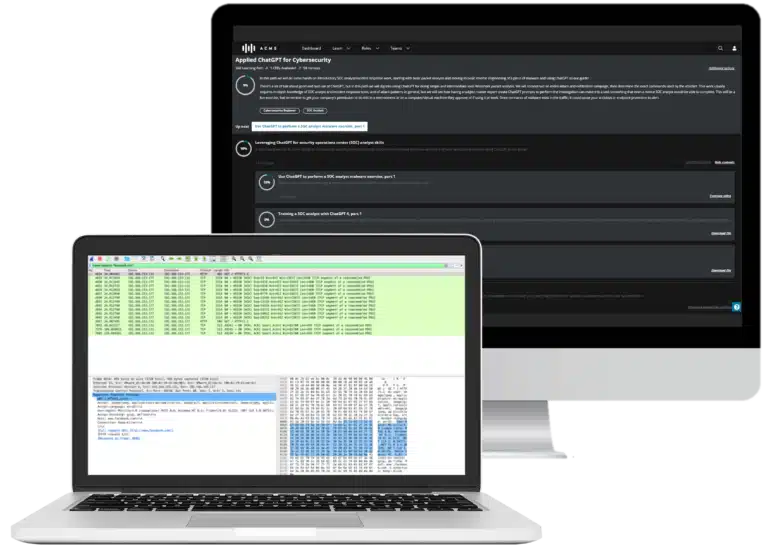Top 10 security engineer interview questions and answers
Cybersecurity engineers must deal with high-pressure situations while remaining calm and knowledgeable — and sometimes, this extends to the interview itself! Don’t stress yourself out, though; there are many different techniques that you can use to overcome interview jitters.

ChatGPT: Self-paced technical training
The main method is to practice answering interview questions. Use the following 10 top security engineer questions to help you prepare for your interview.
1. What is a man-in-the-middle attack?
A MITM attack is when a third party secretly intercepts or redirects communications between the two parties that are communicating with one another. The attacker can inject their data packets into the conversation, or they can listen in and steal data without the two parties realizing that a breach in security has occurred. This occurs most commonly on wireless networks where an attacker can impersonate either one or both of the endpoints of the connection.
Insight into the question: Common cyberattacks are good to know, and a man-in-the-middle attack is important to understand. If you are asked about the attack, you should be able to explain it properly.
2. What is encoding, encryption and hashing?
Encoding ensures that data is formatted correctly so that it can be interpreted properly by applications and recipients. Think of it as data transformed into an easily read scheme to make communications possible.
Encryption makes data unreadable to anybody except for the parties with the secret key used to decrypt the data. This makes it secret and secure and is used for securing data over private connections.
Hashing is a method that ensures that data integrity is maintained. A data hash is a string of data that is generated against the information that is being preserved. By generating a hash and comparing it to the original after transmission, you can verify that the data has not changed if the hashes match. If they don’t match, the information is no longer in its original state and should not be trusted.
Insight into the question: Knowing when to use the right terminology is important in any scientific field, and cybersecurity is no exception. If you hear someone mixing the terminology up, that is a red flag. It shows they might not understand what they are talking about, which is a bad sign in an interview.
3. What is the CIA Triad?
The CIA Triad represents the three fundamental elements of cybersecurity. CIA stands for
- Confidentiality: keeping data hidden and private from the outside world
- Integrity: data has not been manipulated or otherwise changed. Commonly enforced by using identity access management tools and methods
- Availability: accessibility of data for approved users
Insight into the question: Cybersecurity engineers often deal with high-level and highly urgent security issues. With this said, no true master of their craft ignores the basics, the fundamentals of their field. Speaking to these fundamentals will be necessary to demonstrate your prowess in cybersecurity engineering.
4. How do you secure your home network?
Your home network is like your own proverbial sandbox, and how you secure it will demonstrate to the interviewer that your interest in cybersecurity extends beyond the realm of the four walls of your organization. Use this question to demonstrate that you are adept at deploying security in your own network and have a degree of creativity and expertise by mentioning the cocktail of tools, software, methods, and best practices at home.
Insight into the question: This question is a way for you to demonstrate that your passion for security does not go to sleep when you are no longer on the clock. It will also demonstrate that while your IT budget may be minimal compared to your organization, you can still use creativity and knowledge to make your home network as secure as possible.
5. What is a three-way handshake?
The Transmission Control Protocol (TCP) uses the basic three-way handshake when it needs to set up a TCP/IP connection. This is necessary when the connection is made over an IP-based network.
Other terminology associated with a three-way handshake includes SYN, SYN-ACK, and ACK. This is because the TCP is transmitting three messages to negotiate and start a TCP session between two hosts or computers.
Insight into the question: This basic theory question shows your understanding of how a TCP connection is established over an IP network. This connection method is the most common one you will find over the internet and most modern networks, so showing that you understand how it works important.
6. What is cross-site scripting?
Cross-site scripting (or XSS) is a client-side code injection attack. An attacker will execute malicious scripts that perform negative actions in a website or web application without expecting that kind of input. This allows the attacker to perform several actions that they would otherwise not be authorized or able to execute.
Cross-site scripting is one of the most common exploits carried out on the internet through web applications, mainly because vulnerabilities are inadvertently written into the code of these resources. This happens due to a lack of security considerations during the development cycle, and these vulnerabilities have a serious negative effect on business if they are not mitigated.
The best way to combat an XSS vulnerability is with data validation, both on the client and on the server side.
Insight into the question: You want to show that you understand how common this attack is and how serious it potentially is for an unprotected web application on the internet. The key message is that a web application inadvertently uses unvalidated, unauthorized or unencrypted input as code, causing negative outcomes for the user and the business hosting the web application.
7. What techniques can be used to prevent a brute-force login attack?
This is quite a simple answer. To avoid a brute-force attack, you need to ensure that password best practices are in place and strictly adhered to. The easiest way to do this is through policy enforcement on a system level, meaning that even if a user wants to circumvent these measures and use a weak password, they will not be allowed to.
Insight into the question: Brute-force attacks are less common in environments where proper password policies are enforced, so you need to show the interviewer that you understand this and recommend always following best practices regarding information security.
8. You find a USB flash drive in the parking lot with a “2019 salaries” label. What do you do with it?
If you said, “Take it back to HR,” then the interview will probably be over for you. Cybercriminals know that people are curious about salaries, so what better way to ensure that their malware makes its way onto your network than to leave a tantalizing object that could be plugged into a computer in the building?
The correct answer is to report it to the information security department and to never plug it into a computer. Destroying the USB drive is also not the proper approach because a proper and thorough investigation by trained forensics specialists could help determine who the attacker is, which can then be relayed to the proper authorities.
Insight into the question: An interviewer could be curious about your understanding of social engineering and user training. According to some studies, it’s quite likely that such discovered devices are inserted into company computers after being discovered. Therefore, it is a good idea to show that you understand how real the risk is and how important user training as a solution could be.
9. How would you prevent this kind of attack from being successfully carried out?
Preventing attacks requires ongoing user security training. This training shows how susceptible your users are to such attacks.
Another option is having standalone computers segmented off the network and designated as scanning computers for suspect media to be inserted into. However, that still needs to be recommended for media from an unrecognized or unknown source. Scanning stations are generally there for BYOD electronics like USB flash drives and portable hard drives to ensure that you don’t infect your computer if you HAVE to plug it in at work. (With permission, of course.)
Insight into the question: Again, user training and awareness should be a big part of any organization’s cybersecurity strategy, so showing your understanding is a good way of demonstrating that you are aware of the challenges organizations currently face.
10. Have you ever experienced a serious breach?
This is a question that only you can answer effectively. You can explain all of the scenarios you have been involved in, which is a great way of demonstrating your capabilities and understanding of how to act during a breach. How you choose to deal with specific threats could also be of interest to the interviewers, especially if some of the experiences that you share with them relate to their own environments and systems.
Insight into the question: If you feel that sharing your experiences makes you sound like you were unable to protect your environment adequately, then don’t fret. You can explain why you fell victim to a certain attack, and you can also elaborate on how you fixed the issues afterwards. If you decide not to share and tell the interviewers that you have never had a system breach while working, it could mean that you are either not being honest with them or that you don’t have enough experience.
This doesn’t mean that you need to lie or make up stories about system breaches if you really have never experienced one, be aware that the interviewers might prefer candidates that have actively worked with security breaches if the role requires it.

ChatGPT: Self-paced technical training
Nailing the security engineer interview
Going for a job interview is a rollercoaster ride of emotions, from excitement to nervousness. Often the preparation for an interview will make you doubt your skills and experience, but this is normal. Many people suffer from interview nerves.
Always remember that if the job you have your heart set on doesn’t work out for you, there are always other opportunities out there that you’ll eventually find. Cybersecurity is such an in-demand skill that you will likely find interviews for open positions quite often in the coming years.
With a little practice, you will be an interview expert in no time. Just be sure to regularly review as many interview questions as possible, and don’t only focus on the technical aspects of the job. Often, a curveball is just a simple question such as “What are your expectations for this role?” or “Where do you see yourself in five years?”
Soft skills are a definite advantage, especially if you have a user- or manager-facing role that requires face-to-face communication. Lastly, make a good impression by having some questions ready for the end of the interview.
Good luck, and happy practicing!
Sources
- Matthew Tischer, Zakir Durumeric, Sam Foster, Sunny Duan, Alec Mori, Elie Bursztein, Michael Bailey, “Users Really Do Plug in USB Drives They Find“
- 7 Tough Cybersecurity Interview Questions and How to Answer Them, Cyber Talent Network
- Top 50 Cybersecurity Interview Questions and Answers, Edureka
- Top 10 Cybersecurity Engineer Interview Questions, SDX Central









